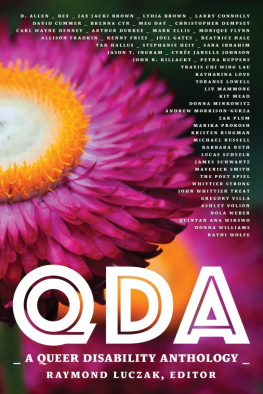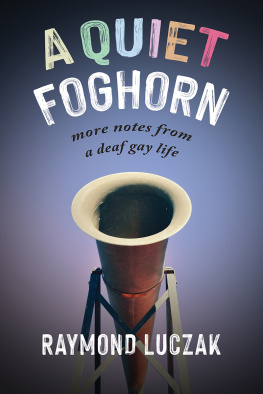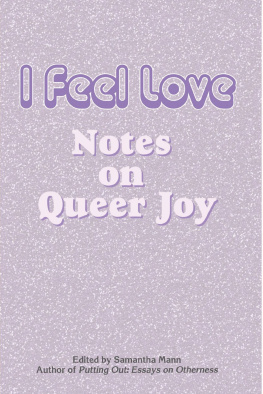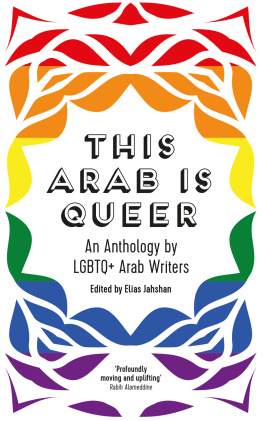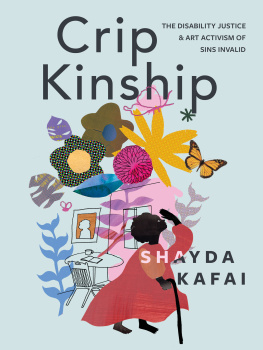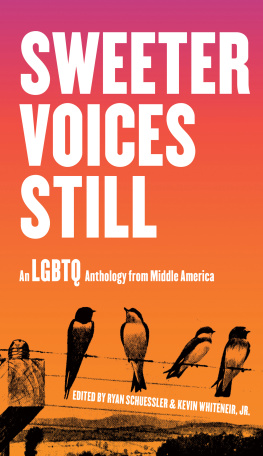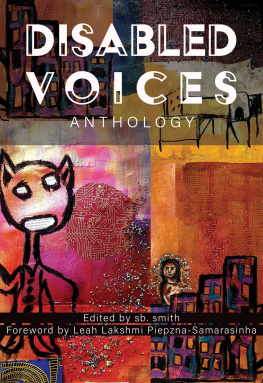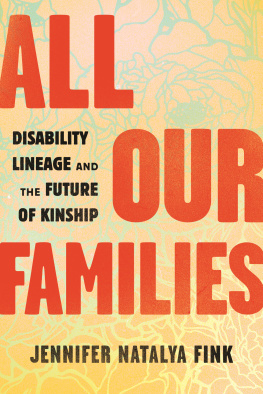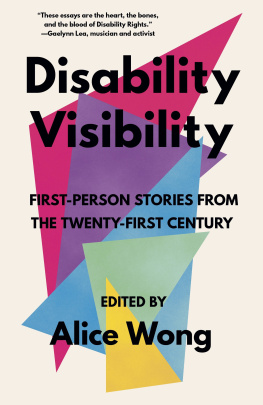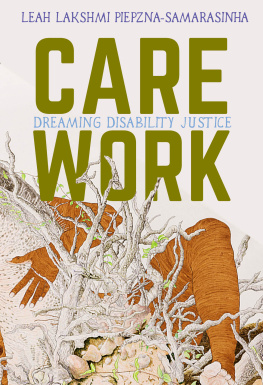QDA
A Queer Disability Anthology
* * *
ALSO BY THE EDITOR
POETRY
How to Kill Poetry
Road Work Ahead
Mute
This Way to the Acorns
St. Michaels Fall
FICTION
Men with Their Hands
NONFICTION
From Heart into Art: Interviews with Deaf and Hard ofHearing Artists and Their Allies
Notes of a Deaf Gay Writer: 20 Years Later
Assembly Required: Notes from a Deaf Gay Life
DRAMA
Whispers of a Savage Sort and Other Plays about theDeaf American Experience
Snooty: A Comedy
AS EDITOR
Among the Leaves: Queer Male Poets on the MidwesternExperience
Eyes of Desire 2: A Deaf GLBT Reader
When I am Dead: The Writings of George M.Teegarden
Eyes of Desire: A Deaf Gay & Lesbian Reader
* * *
QDA
A Queer Disability Anthology
RAYMOND LUCZAK
Editor
Squares & Rebels
Minneapolis, MN
* * *
COPYRIGHT NOTICE
QDA: A Queer Disability Anthology.
Copyright 2015 by Raymond Luczak.
Published by Squares & Rebels (a Handtype Pressimprint) at Smashwords.
Cover design: Mona Z. Kraculdy.
Cover photograph: Adam Marsnik [fotorufus.com].
SMASHWORDS LICENSE STATEMENT
This ebook is licensed for your personal enjoymentonly. This ebook may not be re-sold or given away to other people.If you would like to share this book with another person, pleasepurchase an additional copy for each reader. If youre reading thisbook and did not purchase it, or it was not purchased for your useonly, then please return to your favorite retailer and purchaseyour own copy. Thank you for respecting the hard work of thisauthor.
All rights reserved. No part of this book can bereproduced in any form by any means without written permission.Please address inquiries to the publisher:
Squares & Rebels
PO Box 3941
Minneapolis, MN 55403-0941
squaresandrebels@gmail.com
* * *
IN GRATITUDE
The editor wishes to thank David Cummer for hiseditorial insights as well as Jennifer Bartlett, Bryan Borland,Christopher Bram, John R. Killacky, and Adam Marsnik for theirassistance with this project. He is also grateful for Lennard J.Davis and Scott Jordan Harris for their permission to be quoted atlength in his introduction.
* * *
CONTENTS
RAYMOND LUCZAK _ Introduction
BEX _ Comic
JAX JACKI BROWN _
KENNY FRIES _
BARBARA RUTH _ Poems
TRAVIS CHI WING LAU _ Curvature
KRISTEN RINGMAN _ Poems
SARA IBRAHIM _
MARK ELLIS _ Poems
JOEL GATES _
ASHLEY VOLION _ Poems
ANDREW MORRISON-GURZA _
LUCAS SCHEELK _ Poems
MONIQUE FLYNN _
ALLISON FRADKIN _ Poem
DONNA MINKOWITZ _
D. ALLEN _ Poem
GREGORY VILLA _
LIV MAMMONE _ Poems
KIT MEAD _
ARTHUR DURKEE _ Poems
CHRISTOPHER DEMPSEY _
MICHAEL RUSSELL _ Poems
NOLA WEBER _
KENNY FRIES _ Poems
KRISTEN RINGMAN _
MARIKA PROKOSH _ Poems
TAK HALLUS _
CYRE JARELLE JOHNSON _ Poem
JASON T. INGRAM _
MAVERICK SMITH _ Poem
QUINTAN ANA WIKSWO _
DAVID CUMMER _ Poem
CARL WAYNE DENNEY _
TRAVIS CHI WING LAU _ Poems
TORANSE LOWELL _
WHITTIER STRONG _
JAMES SCHWARTZ _ Poems
BARBARA RUTH _
THE POET SPIEL _ Poem
MARK ELLIS _
JOHN R. KILLACKY _ Video Narratives
BEATRICE HALE _
KATHI WOLFE _ Poems
D. ALLEN _
CHRISTOPHER DEMPSEY _ Poem
JOHN WHITTIER TREAT _
MEG DAY _ Poem
BRENNA CYR _
STEPHANIE HEIT & PETRA KUPPERS _ Poem
LARRY CONNOLLY _
RAYMOND LUCZAK _ Poems
LYDIA BROWN _
DONNA WILLIAMS _ Poems
KATHARINA LOVE _
JAX JACKI BROWN _ Poems
ZAK PLUM _ Comic
* * *
Without deviation from the norm,progress is not possible.
Frank Zappa
IN MEMORIAM
Cook Friedman
1949 - 1993
* * *
RAYMOND LUCZAK
No More Inspiration Porn:Introduction
Half a lifetime ago, in the fall of 1988, when Ifirst saw Cook Friedman in a large room at the Gay and LesbianCommunity Center, I had no idea who he was. He was lanky with ahead of thick curly hair and a sexy smile, and he sat with a woodencane. I had just moved to New York City, and in those pre-Internetdays, there wasnt an easy way of connecting with the Deaf LGBTcommunity. I decided to try the next best option, which was EDGE(Education in a Disabled Gay Environment); it was listed among thegroups that met at the GLCC.
Folding chairs were arranged in a circle. A tallolder man with a thick mustache looked embarrassed by a young Deafman with limited motor skills blatantly fixated on him. An olderfeminine lesbian sitting in a wheelchair gave me the nicest smileof anyone I saw. A clean-shaven man who didnt seem to bephysically disabled joined us. There werent many of us, butbecause there was no American Sign Language (ASL) interpreter, Iwasnt sure how well Id be able to lipread and follow thediscussion. Luckily everyone was fairly easy to lipread. Cookturned out to be the person in charge. He was funny and kind.
Afterward we became friends. He lived in a tinyrailroad flat a few blocks away from GLCC. I was agog at the sizeof his vinyl record collection. He loved music, and he knew whereeach album was. His record player seemed to have its own shrinewhere the walls of his cramped living room were graced with recordssqueezed into shelves. He was very proud of the fact that theauthor Christopher Bram, his neighbor and friend, modeled hischaracter Jack Arcallis home in his novel In Memory of AngelClare on his apartment. Cook told me stories about the halcyondays of the 1960s and 1970s when he dated Judy Garlands lasthusband and partied in St. Marks Baths and worked in a recordstore on West 8th Street where he met John Lennon and Yoko Ono ascustomers and danced all night long in discos. He was working as ahairdresser during the 1980s when he started to notice that hisbody wasnt always cooperating with him. He felt strangelyuncoordinated. Then he learned why: multiple sclerosis.
I had heard of MS before. My first sign languageteacher had it. When my deafness was diagnosed at the age of twoand half years, I was immediately outfitted with a bulky hearingaid in a chest harness and brought to an elementary school near myhome for speech and lipreading lessons. Sign language wasforbidden.
In my small hometown, there was an older Deaf manwho was a high school dropout from the Michigan School of the Deafand he worked as a dishwasher for the Holiday Inn, although Iwouldnt know these two facts for a number of years. I did noticean incontestable fact about him: on summer days, while sitting infront of a bar on Aurora Street, he always seemed to be teachingsomeone how to fingerspell and sign. I remember a few occasionswhile in the car my mother turned my head away not to look at him.This made me doubly curious about his hands. I sensed they werecapable of saying something more than just directional gestures,but I didnt understand that it was a fully-realizedlanguage on a par with English.
Then I was mainstreamed full-time in a Catholicschool for five years. I felt increasingly suicidal. My hearingclassmates treated me as the runt of their class, and I cried agreat deal. Then one day I turned off my faucet of emotioncompletely; it would take me years to allow myself to feelunfettered emotion in front of a stranger. My face revealed nothingfor fear of being bullied again. It didnt help that my own hearingfamilyI had eight siblingsnever slowed down their dinnerconversations enough to enable me to follow them. First I had tofigure who was speaking and then
Next page
